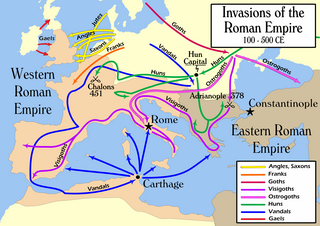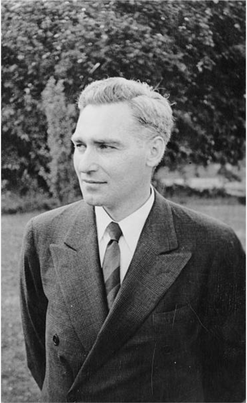Sources
- "Thomas S. Burns". Emory University . Retrieved September 10, 2020.
- "Thomas Samuel Burns" (PDF). Emory University . Retrieved September 10, 2020.
Thomas S. Burns | |
|---|---|
| Born | June 7, 1945 |
| Nationality | American |
| Academic background | |
| Alma mater | |
| Academic work | |
| Discipline |
|
| Institutions | |
| Main interests | "Barbarian"-Roman relations |
Thomas Samuel Burns (born June 7,1945) is an American historian who is Samuel Candler Dobbs Professor Emeritus of Late Ancient and Medieval History at Emory University. He specializes on relations between "barbarians" and Romans in classical antiquity.
Thomas S. Burns was born in Michigan City,Indiana,on June 7,1945. He received his A.B. (1967) from Wabash College and his M.A. (1968) and Ph.D. (1974) from the University of Michigan. His thesis was supervised by Sylvia L. Trupp and John W. Eadie.
After gaining his Ph.D.,Burns served as Assistant Professor (1974–1980) and then Associate Professor (1980–1985) of History at Emory University. Since 1985,Burns was Samuel Candler Dobbs Professor of Late Ancient and Medieval History at Emory University (1985–2010). He was Chair of the Department of History at Emory University in 1989–1992 and 2006–2007. Burns retired as S. C. Dobbs Professor Emeritus in 2010.
Burns specializes in late ancient and early medieval history and archaeology. He is particularly interested in relationships between "barbarians" and Romans. Burns is well known as an authority on the Ostrogoths.

Theodoricthe Great, also called Theodoric the Amal, was king of the Ostrogoths (475–526), and ruler of the independent Ostrogothic Kingdom of Italy between 493 and 526, regent of the Visigoths (511–526), and a patrician of the Eastern Roman Empire. As ruler of the combined Gothic realms, Theodoric controlled an empire stretching from the Atlantic Ocean to the Adriatic Sea. Though Theodoric himself only used the title 'king' (rex), some scholars characterize him as a Western Roman Emperor in all but name, since he ruled a large part of the former Western Roman Empire described as a Res Publica, had received the former Western imperial regalia from Constantinople in 497 which he used, was referred to by the imperial title princeps by the Italian aristocracy and exercised imperial powers recognized in the East, such as naming consuls.

The Migration Period, also known as the Barbarian Invasions, was a period in European history marked by large-scale migrations that saw the fall of the Western Roman Empire and subsequent settlement of its former territories by various tribes, and the establishment of the post-Roman kingdoms.
Foederati were peoples and cities bound by a treaty, known as foedus, with Rome. During the Roman Republic, the term identified the socii, but during the Roman Empire, it was used to describe foreign states, client kingdoms or barbarian tribes to which the empire provided benefits in exchange for military assistance. The term was also used, especially under the empire, for groups of barbarian mercenaries of various sizes who were typically allowed to settle within the empire.
Teia, also known as Teja, Theia, Thila, Thela, and Teias, was the last Ostrogothic King of Italy. He led troops during the Battle of Busta Gallorum and had noncombatant Romans slaughtered in its aftermath. In late 552/early 553, he was killed during the Battle of Mons Lactarius. Archaeological records attesting to his rule show up in coinage found in former Transalpine Gaul.

The term Western Roman Empire is used in modern historiography to refer to the western provinces of the Roman Empire, collectively, during any period in which they were administered separately from the eastern provinces by a separate, independent imperial court. Particularly during the period from AD 395 to 476, there were separate, coequal courts dividing the governance of the empire into the Western provinces and the Eastern provinces with a distinct imperial succession in the separate courts. The terms Western Roman Empire and Eastern Roman Empire were coined in modern times to describe political entities that were de facto independent; contemporary Romans did not consider the Empire to have been split into two empires but viewed it as a single polity governed by two imperial courts for administrative expediency. The Western Empire collapsed in 476, and the Western imperial court in Ravenna disappeared by AD 554, at the end of Justinian's Gothic War.
Alatheus and Saphrax were Greuthungi chieftains who served as co-regents for Vithericus, son and heir of the Gothic king Vithimiris.

Thomas Robert Shannon Broughton, FBA was a Canadian classical scholar and leading Latin prosopographer of the twentieth century. He is especially noted for his definitive three-volume work, Magistrates of the Roman Republic (1951-1986).

The Sack of Rome on 24 August 410 AD was undertaken by the Visigoths led by their king, Alaric. At that time, Rome was no longer the administrative capital of the Western Roman Empire, having been replaced in that position first by Mediolanum in 286 and then by Ravenna in 402. Nevertheless, the city of Rome retained a paramount position as "the eternal city" and a spiritual center of the Empire. This was the first time in almost 800 years that Rome had fallen to a foreign enemy, and the sack was a major shock to contemporaries, friends and foes of the Empire alike.
John Haughton D'Arms was the Gerald F. Else Professor of Humanities and professor of classical studies and history at the University of Michigan in Ann Arbor. He also served as president of the American Council of Learned Societies (ACLS). He served ACLS until his death in 2002. He died of brain cancer in New York City.
Kenneth W. Harl is an American scholar, author, and classicist. He received his B.A. in Classics and History at Trinity College, and his M.A. and PhD at Yale University. He was a Professor of History at Tulane University in New Orleans until his retirement in 2022.
Peter John Heather is a British historian of late antiquity and the Early Middle Ages. Heather is Chair of the Medieval History Department and Professor of Medieval History at King's College London. He specialises in the fall of the Western Roman Empire and the Goths, on which he for decades has been considered the world's leading authority.
Arther Ferrill, now a professor emeritus of history at the University of Washington at Seattle, is a respected expert on Ancient Rome and military history. He has written four books and is a regular contributor to MHQ: The Quarterly Journal of Military History and other periodicals, as an author and in review of other authors.
Timothy J. Cornell is a British historian specializing in ancient Rome. He is an Emeritus Professor of Ancient History at the University of Manchester, having retired from his teaching position in 2011.
Walter Andre Goffart is a German-born American historian who specializes in Late Antiquity and the European Middle Ages. He taught for many years in the history department and Centre for Medieval Studies of the University of Toronto (1960–1999), and is currently a senior research scholar at Yale University. He is the author of monographs on a ninth-century forgery, late Roman taxation, four "barbarian" historians, and historical atlases.
Dan Reiter is an American political scientist. He is currently the Samuel Candler Dobbs Professor at the Department of Political Science at Emory University.
Cynthia Willett is an American philosopher who is Samuel Candler Dobbs Professor of Philosophy at Emory University, where she is also affiliated faculty with Women, Gender, and Sexuality Studies and with the Psychoanalytic Studies Program. She has written influential books on intersectional feminism and founded Emory's Institute for the History of Philosophy. Willett was on the American Philosophical Association's Executive Board between 2008 and 2010, and has served as co-director of the Society for Phenomenology and Existential Philosophy. She earned her Ph.D. in 1988 from Pennsylvania State University.
Paul Harold Rubin is an American economist and the Samuel Candler Dobbs Professor of Economics Emeritus at Emory University. He was President of the Southern Economic Association in 2012-2013. He is also a research fellow at The Independent Institute.
Lynne Huffer is Samuel Candler Dobbs Professor Philosophy at Emory University and widely known for her work on queer theory and Foucault. In her career at Yale, Rice, and Emory Universities, she has won numerous awards, including four major teaching prizes at Emory and Rice Universities, as well as the Modern Languages Association Florence Howe Award for feminist scholarship in English (2011). Huffer is also co-editor, with Shannon Winnubst, of philoSOPHIA: A Journal of Continental Feminism.
Dianne Marie Stewart is Samuel Candler Dobbs Professor of Religion and African American Studies at Emory University. Dr. Stewart's work focuses on religion, culture and African heritage in the Caribbean and the Americas as well as womanist religious thought and praxis. Dianne M. Stewart is the author of Three Eyes for the Journey: African Dimensions of the Jamaican Religious Experience (Oxford University Press, 2005), Black Women, Black Love: America’s War on African American Marriage and Obeah, Orisa and Religious Identity in Trinidad, Volume II, Orisa: Africana Nations and the Power of Black Sacred Imagination.